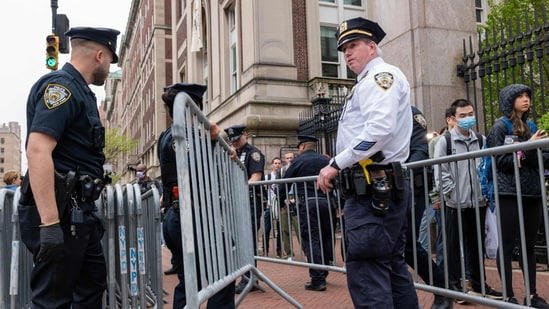The New York City Police Department (NYPD) made a decisive move by entering Columbia University campus to detain pro-Palestinian protesters. The incident, which unfolded amidst heightened tensions surrounding the Israel-Palestine conflict, has sparked debates about freedom of speech, campus safety, and the role of law enforcement in handling protests.
The scene at Columbia University was charged with emotion as demonstrators voiced their support for Palestine, condemning what they see as Israeli aggression in the region. Holding signs and chanting slogans, the protesters gathered to express solidarity with the Palestinian cause, a sentiment echoed by many across the globe.
However, the peaceful demonstration took a dramatic turn when NYPD officers entered the university premises to intervene. Eyewitnesses reported a sense of confusion and apprehension as police officers began to detain protesters, leading to a standoff between law enforcement and demonstrators.
The decision to deploy police forces on the university campus raises questions about the appropriate response to protests in academic settings. Columbia University, known for its commitment to fostering open dialogue and critical thinking, has long been a space for students to engage in political activism and express dissenting viewpoints. The presence of armed officers on campus has ignited concerns about the chilling effect it may have on free speech and academic freedom.
Critics argue that the NYPD’s intervention was heavy-handed and disproportionate, infringing upon the rights of protesters to assemble peacefully and express their opinions. They contend that the use of force by law enforcement only serves to escalate tensions and suppress dissent, rather than facilitating constructive dialogue and understanding.
On the other hand, proponents of the police action maintain that law enforcement has a responsibility to maintain public order and ensure the safety of all individuals, including students, faculty, and staff. They argue that the presence of protesters on campus posed a potential threat to security and necessitated swift action to prevent any escalation of conflict or violence.
Amidst the debate surrounding the NYPD’s intervention, questions have also been raised about the broader context of the Israel-Palestine conflict and its impact on academic institutions. Universities, as hubs of intellectual exchange and diversity, often find themselves at the forefront of contentious political issues, serving as platforms for activism and advocacy.
The events at Columbia University underscore the complexities of navigating political discourse and activism within academic settings, where tensions can run high and opinions diverge sharply. While universities strive to uphold principles of free speech and open inquiry, they must also grapple with the challenges of maintaining a safe and inclusive environment for all members of their community.
Moving forward, stakeholders must engage in constructive dialogue to address the underlying issues that led to the confrontation at Columbia University. This includes fostering a culture of respect, empathy, and understanding, as well as finding peaceful and productive ways to address differences of opinion on contentious issues such as the Israel-Palestine conflict.
In the aftermath of the incident, both the NYPD and Columbia University have faced calls for transparency and accountability regarding their handling of the situation. As investigations unfold and conversations continue, it remains to be seen how the events at Columbia will shape the discourse surrounding campus activism, law enforcement practices, and the pursuit of justice in an increasingly polarized world.

